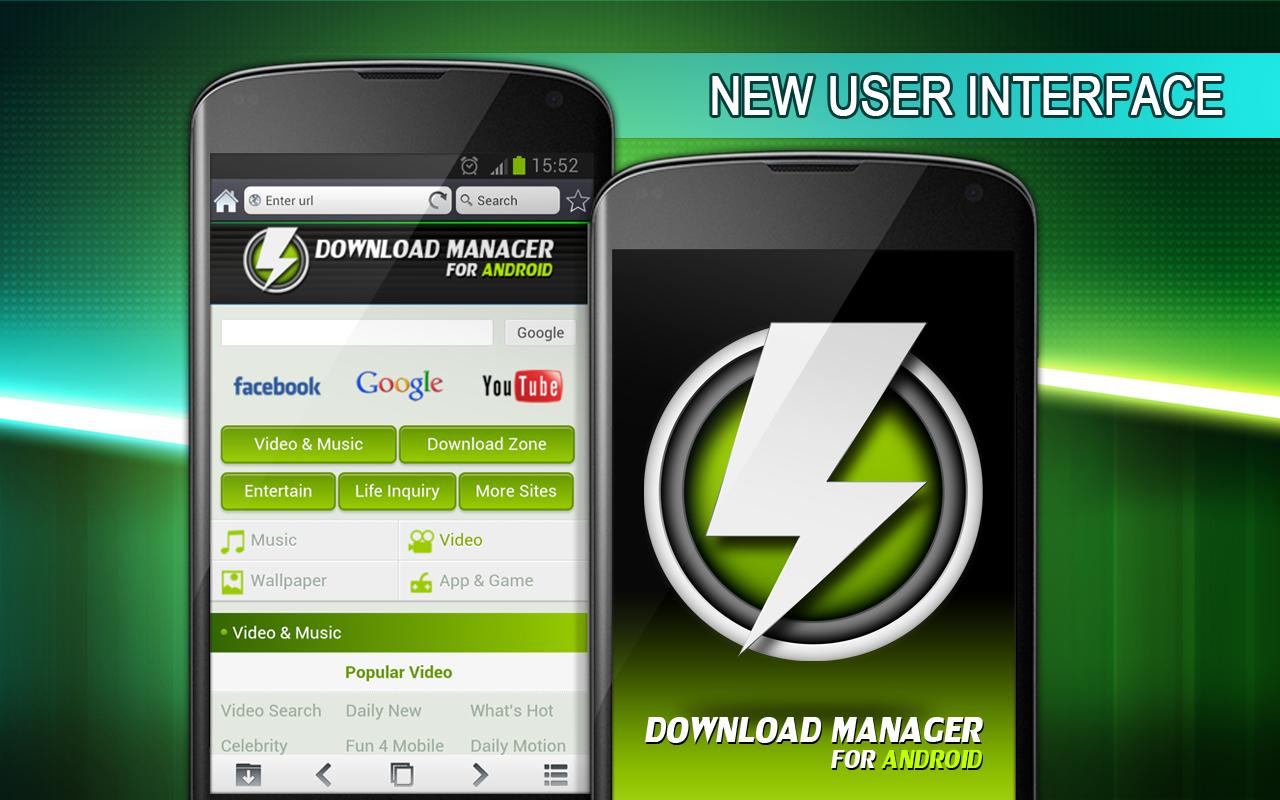Download Manager Setup For Android
Download file manager android, file manager android, file manager android download free. File Management. File Manager. Set up your phone just how you like it. Android File Manager. A very simple file management tool. OI File Manager. Dec 03, 2018 Download File Manager 2.7.8. A simple but powerful file manager for Android. File Manager is a file management app for Android that allows you to work with your files in a similar way to how you would do it on a computer, supporting features like copying, pasting, and cropping. The app supports local.
- Download Manager Like Idm For Android
- Download Manager For Android
- Download Android Manager For Pc
- Internet Download Manager Idm For Android
Topics:
You must have the Android SDK and developer tools to test and debug mobile applications for Android.
Go to the Android SDK download page at
http://developer.android.com/sdk/index.html.Scroll to the bottom of the page and expand GET THE SDK FOR AN EXISTING IDE.
Click Download the stand-alone Android SDK Tools for Windows.
Agree to the terms and conditions.
Click Download the SDK Tools for Windows, and then click Save File.
Save and then run
installer_rversion-windows.exeto start the Android SDK Tools Setup wizard.On the Welcome page, click Next.
After the wizard detects where the Java SE Development Kit is installed, click Next.
On the Choose Users page, select whether to install for anyone using the computer or just yourself, and then click Next
On the Choose Install Location page, enter the destination folder, such as
C:Androidandroid-sdk, and then click Next.Make a note of where you installed the files. You will need this information when you configure JDeveloper 11.1.2.4 in Task 3, 'Configure Oracle ADF Mobile for the Android Platform'.
On the Choose a Start Menu folder page, select the Start Menu folder or select Do not create shortcuts, and then click Install.
After the installation completes, click Next.
Ensure that Start SDK Manager is selected, and then click Finish.
You use the manager in the next task to install additional packages.
Download Manager Like Idm For Android

Because the emulator in later versions requires more memory and is slower, use Android 4.2.2 (API 17) to develop and test the Business Card Scanner mobile application. In addition to the Android 4.2.2 SDK platform and ARM EABI v7a system image, you must also install the Android Support Library, Google Cloud Messaging for Android Library, and Google USB Driver. Use the Android SDK Manager to select and install the packages.
If the Android SDK manager isn't open, complete one of the following steps:
From the Start menu, find and select SDK Manager.
Go to the folder that you installed the Android SDK in, such as
C:Androidandroid-sdk, and then double-clickSDK Manager.exe.You might need to run this executable file as an administrator. To do so, right click
SDK Manager.exeand select Run as Administrator.
The Android SDK Manager might take several seconds to start.
In the Packages section shown in the following figure, expand Tools.
Description of the illustration android-mgr-pkgs-tools.pngIn the Tools section, select the most current revision of the following, if they aren't already installed:
Android SDK Tools
Android SDK Platform-tools
Android SDK Build-tools
Select Android SDK Build-tools for revision 17 (in addition to the Android SDK Build-tools for the most current version).
Expand Android 4.2.2 (API 17), and then select the following packages:
SDK Platform
ARM EABI v7a System Image
Select Obsolete to include obsolete packages in the list as shown in the following figure:
Description of the illustration android-mgr-pkgs-ex.pngExpand Extras, and then select the following packages:
Android Support Library
Google Cloud Messaging for Android Library (Obsolete)
Google USB Driver
Click Install Packages.
Accept the license, and then click Install.
Close the manager.
The sdkmanager is a command line tool that allows you to view, install,update, and uninstall packages for the Android SDK. If you're using AndroidStudio, then you do not need to use this tool and you can instead manage yourSDK packages from the IDE.
The sdkmanager tool is provided in the Android SDK Tools package(25.2.3 and higher) and is located inandroid_sdk/tools/bin/.
Usage

You can use the sdkmanager to perform the following tasks.
List installed and available packages
Install packages
The packages argument is an SDK-style path as shown withthe --list command, wrapped in quotes (for example,'build-tools;29.0.0' or'platforms;android-28'). You can pass multiple packagepaths, separated with a space, but they must each be wrapped in their own set ofquotes.
For example, here's how to install the latest platform tools (which includesadb and fastboot) and the SDK tools for API level 28:
Alternatively, you can pass a text file that specifies all packages:
Download Manager For Android
The package_file argument is the location of a text file in whicheach line is an SDK-style path of a package to install (without quotes).
To uninstall, simply add the --uninstall flag:
Download Android Manager For Pc
Update all installed packages
Options
The following table lists the available options for the above commands.
| Option | Description |
|---|---|
--sdk_root=path | Use the specified SDK path instead of the SDK containing this tool |
--channel=channel_id | Include packages in channels up to channel_id. Available channels are:
|
--include_obsolete | Include obsolete packages in the package listing or package updates. For use with --list and --update only. |
--no_https | Force all connections to use HTTP rather than HTTPS. |
--verbose | Verbose output mode. Errors, warnings and informational messages are printed. |
--proxy={http socks} | Connect via a proxy of the given type: either http for high level protocols such as HTTP or FTP, or socks for a SOCKS (V4 or V5) proxy. |
--proxy_host={IP_addressDNS_address} | IP or DNS address of the proxy to use. |
--proxy_port=port_number | Proxy port number to connect to. |
Internet Download Manager Idm For Android
If you want to install packages for anoperating system different from the current machine, set theREPO_OS_OVERRIDEenvironment variable to either 'windows', 'macosx', or 'linux'.